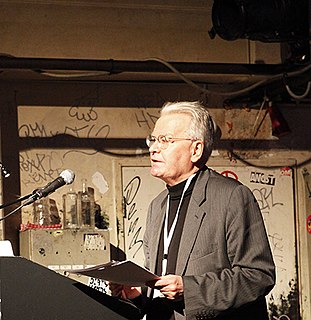A Quote by Bryan Appleyard
Modernism may be seen as an attempt to reconstruct the world in the absence of God.
Related Quotes
The British are supposed to be particularly averse to intellectuals, a prejudice closely bound up with their dislike of foreigners. Indeed, one important source of this Anglo-Saxon distaste for highbrows and eggheads was the French revolution, which was seen as an attempt to reconstruct society on the basis of abstract rational principles.
Modernism in a way, early modernism, for instance, in pictures, was turning against perspective and Europe. And all early modernism is actually from out of Europe, when you think of cubism is African, is looking at Africa, Matisse is looking at the arabesque, Oceania. Europe was the optical projection that had become photography, that had become film, that became television and it conquered the world.
That's the thing I want to make clear about depression: It's got nothing at all to do with life. In the course of life, there is sadness and pain and sorrow, all of which, in their right time and season, are normal-unpleasant, but normal. Depression is an altogether different zone because it involves a complete absence: absence of affect, absence of feeling, absence of response, absence of interest. The pain you feel in the course of a major clinical depression is an attempt on nature's part (nature, after all, abhors a vacuum) to fill up the empty space.
The moment in the account of Adam and Eve in the book of Genesis is when they realize they're naked and try and cover themselves with fig leaves. That seemed to me a perfect allegory of what happened in the 20th century with regard to literary modernism. Literary modernism grew out of a sense that, “Oh my god! I'm telling a story! Oh, that can't be the case, because I'm a clever person. I'm a literary person! What am I going to do to distinguish myself?...a lot of modernism does seem to come out of a fear of being thought an ordinary storyteller.
Oh that God would give me the thing which I long for! That before I go hence and am no more seen, I may see a people wholly devoted to God, crucified to the world, and the world crucified to them. A people truly given up to God in body, soul and substance! How cheerfully would I then say, 'Now lettest thou thy servant depart in peace.'
I can see now how deeply God's absence affected my unconscious life, how under me always there was this long fall that pride and fear and self-love at once protected me from and subjected me to.... For if grace woke me to God's presence in the world and in my heart, it also woke me to his absence. I never truly felt the pain of unbelief until I began to believe.
Whatever man may stand, whatever he may do, to whatever he may apply his hand - in agriculture, in commerce, and in industry, or his mind, in the world of art, and science - he is, in whatsoever it may be, constantly standing before the face of God. He is employed in the service of his God. He has strictly to obey his God. And above all, he has to aim at the glory of his God.

































